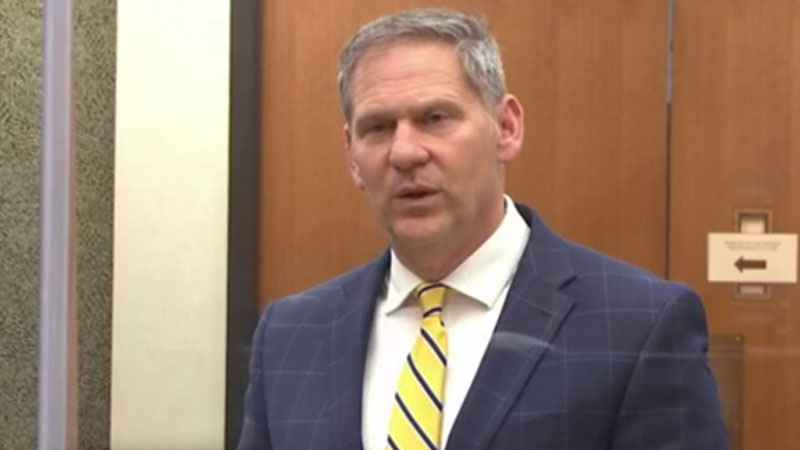Experienced trial attorney: Prosecution had ‘huge win’ in Chauvin trial Thursday
[anvplayer video=”5018458″ station=”998122″]
On Thursday, prosecutors presented the jury an image of the aftermath of George Floyd’s encounter with Minneapolis police.
Two paramedics who responded to the 911 call testified that Floyd didn’t have a pulse when they got to the scene.
“In a living person there should be a pulse,” said Derek Smith, a Hennepin County paramedic. "I did not feel one. I suspected this patient to be dead.”
Smith told jurors that his partner drove the rig a couple of blocks from the scene as he continued to provide care to Floyd. His partner parked and jumped in the back to help, where former officer Thomas Lane was also assisting.
Chauvin’s attorney Eric Nelson asked, “Why didn’t you just have the officer continue to help you so you could just go to the hospital? … Is it because he’s not an EMT?”

[KSTP]
Smith responded, “Any layperson can do chest compressions. There’s no reason Minneapolis couldn’t have started chest compressions.”
When Nelson pressed, Smith said, “I don’t know the level of certification of the individual who got in the back of my rig. … I wanted as many people that were willing to help me at that time to work this cardiac arrest.”
We asked experienced trial attorney Lee Hutton about the interaction.
“It’s just amazing when you have these points. Number one is they’re Minneapolis employees testifying against Minneapolis employees,” Hutton said. “The second is when they said they arrived on scene they certainly don’t give any praise to the officers. In fact, they said ‘When we arrived on the scene, George Floyd’s pulse was not functional.’ And the third thing that was significant is they said, ‘We tried to revive George Floyd and basically no one helped.’”
Another significant moment in court came as Sgt. David Pleoger was questioned. He was the Third Precinct supervisor on May 25, 2020.
He responded to the scene after a 911 dispatcher called him with concerns about the encounter she was witnessing on surveillance cameras. Pleoger, now retired, said he followed up with a call to Chauvin.
More from KSTP:
In Derek Chauvin trial, testimony is key. But questions are equally important
After visiting the scene, Pleoger said he went to the Hennepin County Medical Center, where doctors and nurses were working to revive Floyd. He told the court that Chauvin and former officer Tou Thao joined him there.
“[Chauvin] said he knelt on Floyd, knelt on his neck, something of that nature — I don’t recall his exact words,” Pleoger said when asked about his conversation with Chauvin at the hospital.
Prosecution attorney Steve Schleicher pressed him, asking, “Is that the first time you became aware that force had been applied to Floyd’s neck?”
Pleoger responded yes and then told Schleicher that Chauvin did not tell him how long he applied pressure or restrained Floyd.
Jurors were shown a still image from body camera footage of Chauvin at the hospital.
“It’s possible the jury will say, ‘Huh, this theme is starting to develop,’” Hutton said. “For these officers to be at the hospital after somebody just was in their demise may have some silent consequences that the defense is going to have to be mindful in their case in chief.”
Hutton said another critical moment came as Schleicher questioned Pleoger about when the officers should’ve stopped using their restraint on Floyd.
“When Mr. Floyd was no longer offering up any resistance to officers, they could’ve ended their restraint,” Pleoger said.
Schleicher followed up: “After he was handcuffed on the ground and no longer resisting?”
“Correct," Pleoger responded.
We asked Hutton how significant that will be for each case.
“I think it’s going to be very, very powerful,” he said. “He’s speaking from a level of experience, I would assume, and for the jury to not hear that from Chauvin, which they’re not going to hear from, and to hear it from his boss, his supervisor, could be one of the most powerful testimonies we’ve heard thus far.”
Hutton doubts Chauvin will choose to testify.
State prosecutors also brought up Floyd’s drug used during the testimony of his former girlfriend Courteney Ross.
“Both Floyd and I, our story, it’s a classic story of how many people get addicted to opioids. We both suffered from chronic pain,” Ross said. “We got addicted and tried really hard to break that addiction many times.”
This opened up a line of questioning from the defense about the type of pills they were taking last year. Nelson questioned Ross about an FBI interview she did in which she said Floyd may have gotten pills from Morries Hall.
Hall was with Floyd on May 25, 2020, and notified the court on Wednesday that he plans to invoke his Fifth Amendment right against self-incrimination.
Still, Hutton thinks the state was successful in its approach.
“I think the state did a masterful job in saying, ‘We are going to address this right off the bat, we’re going to do it early in the trial,’” he said.
“We’re learning how pervasive [opioid addiction] is in the country, so the state wanted that to come out, from no one else but Courteney Ross. And when that testimony comes out from Courteney Ross, Eric Nelson has to decide how heavily he’s going to go after her and he did, in fact, go after her, and now we’re going to see if the jury sympathizes and has some empathy for Courteney Ross. Or do they buy into the defense strategy of attacking Ms. Ross.”